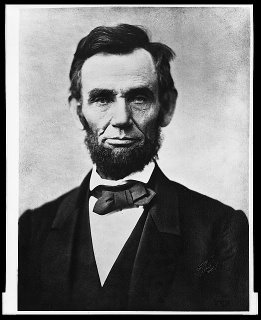Failure, not the end, but a new opportunity.

Today I would like to continue my series on leadership with the profile of one of my all time favorite people, Abraham Lincoln. Lincoln is not only my favorite American President, but he is also an incredibly fascinating person to study. I think that what he persevered through, and what he was able to accomplish while on this earth is astonishing. My third profile on leadership is good ol’ Honest Abe
Lincoln had humble beginnings as he was born to a poor family in rural Kentucky. Lincoln moved quite a bit when he was young from Indiana to Illinois. His mom died when he was 10, and he had to struggle for everything he got from day one. Lincoln essentially taught himself to read and write, and later with the help of his stepmother, he perfected much of what he had learned. Throughout his younger years Lincoln did many things to keep his mind sharp, and learn as much as he could. His vocational experience included: farming, storekeeper, Captain in the Black Hawk war (which is one of the things for which Lincoln received criticism because of brutality shown in the war towards Native Americans), he served in the Illinois legislator, and served on the circuit of courts for many years. He ran for the U.S. Senate, and than became President.
Through his experiences growing up, and into his adult life, Lincoln became very familiar with failure. He failed at business, he essentially failed at being a farmer, he failed at his first attempt and others at getting into politics, and he initially failed at keeping a fragile country together. However, Lincoln did not allow any of this to drag him down, he persisted and pushed on because he knew that his values were for a higher cause. Once Lincoln became President he faced strong opposition from all across the board of his desire to strengthen the Federal government, and of course later to grant emancipation to the nations slaves. While it is true that Lincoln did not see the African American as his equal, he thought that slavery was inhumane. “As I would not be a slave, so I would not be a master, this expresses my idea of democracy.”
Lincoln receives a lot of credit for his wartime leadership, and for good reason. In his first Inaugural address Lincoln warned the south that “In your hands, my dissatisfied fellow countrymen, and not in mine, is the momentous issue of civil war. The government will not assail you.... You have no oath registered in Heaven to destroy the government, while I shall have the most solemn one to preserve, protect and defend it." Lincoln lived up to his word; he defended and protected his country. When he gave his famous speech on the battlefield at Gettysburg he commented that the dead had not died in vein, and that through their efforts, “government of the people, by the people, for the people shall not perish from the earth.” Lincoln understood failure as president as well. He had to appoint and demote numerous Generals to lead the Union forces, yet Lincoln never relented.
Through it all Lincoln was assassinated for his efforts. He was assassinated because he did what he believed to be right, not for himself, but for the country. Lincoln rarely received personal gain for his efforts. He lost two sons, and had to often deal with a fragile, emotionally ailing wife, yet Lincoln wanted to push forward to “strive on to finish the work we are in; to bind up the nations wounds.” Lincoln unfortunately never got to see his nation healed of its wounds, but his legacy lived on regardless. Lincoln is important to all of us because he is the very definition of leadership. He persevered through so much turmoil and hardship, and became known as one of if not the greatest Presidents ever. War was inevitable and Lincoln knew it. Yet out of war Lincoln saw a new nation, a re-birth of the democratic process that America’s founding fathers saw and created. Slavery was nothing new; it was something that John Adams addressed many times at the founding of the nation. Slavery was the eight hundred pound elephant in the room that no one wanted to talk about; the issue that no president dared to approach, yet Lincoln knew that it was not only his duty, but also his destiny in a sense. Lincoln knew that this was his time, his place, and leadership was his sworn duty.

0 Comments:
Post a Comment
<< Home